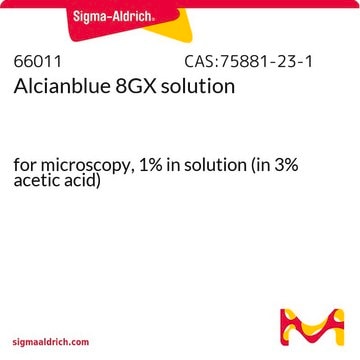A5268
Alcian Blue 8GX
powder
Synonym(s):
Alcian Blue, Ingrain Blue 1
About This Item
Recommended Products
form
powder
composition
Dye content, 45-65%
color
blue
solubility
H2O: 1 mg/mL
εmax
425 at 615-630 nm in water
application(s)
diagnostic assay manufacturing
hematology
histology
storage temp.
room temp
SMILES string
[Cl-].[Cl-].[Cl-].[Cl-].CN(C)C(\SCc1ccc2c3nc(nc4n5[Cu]n6c(nc7nc(nc5c8cc(CS\C(N(C)C)=[N+](\C)C)ccc48)c9ccc(CS\C(N(C)C)=[N+](\C)C)cc79)c%10ccc(CS\C(N(C)C)=[N+](\C)C)cc%10c6n3)c2c1)=[N+](/C)C
InChI
1S/C56H68N16S4.4ClH.Cu/c1-65(2)53(66(3)4)73-29-33-17-21-37-41(25-33)49-57-45(37)62-50-43-27-35(31-75-55(69(9)10)70(11)12)19-23-39(43)47(59-50)64-52-44-28-36(32-76-56(71(13)14)72(15)16)20-24-40(44)48(60-52)63-51-42-26-34(18-22-38(42)46(58-51)61-49)30-74-54(67(5)6)68(7)8;;;;;/h17-28H,29-32H2,1-16H3;4*1H;/q+2;;;;;+2/p-4
InChI key
CKLBXIYTBHXJEH-UHFFFAOYSA-J
Looking for similar products? Visit Product Comparison Guide
Related Categories
General description
Application
- Alcian Blue 8GX has been used for the staining and precipitation of glycosaminoglycans and as a heteroglycan stain for neutral, sulfated, and phosphated mucopolysaccharides and glycosaminoglycans in tissues such as cartilage and extracellular matrices.
- It has been employed in the in vivo visualization of intravascular Bonghan ducts and corpuscles in murine models.
- It has been used to develop a novel histochemical staining method to assess multiple respiratory parameters in various species.
Features and Benefits
Principle
Storage Class Code
11 - Combustible Solids
WGK
WGK 3
Flash Point(F)
Not applicable
Flash Point(C)
Not applicable
Personal Protective Equipment
Certificates of Analysis (COA)
Search for Certificates of Analysis (COA) by entering the products Lot/Batch Number. Lot and Batch Numbers can be found on a product’s label following the words ‘Lot’ or ‘Batch’.
Already Own This Product?
Find documentation for the products that you have recently purchased in the Document Library.
Our team of scientists has experience in all areas of research including Life Science, Material Science, Chemical Synthesis, Chromatography, Analytical and many others.
Contact Technical Service





